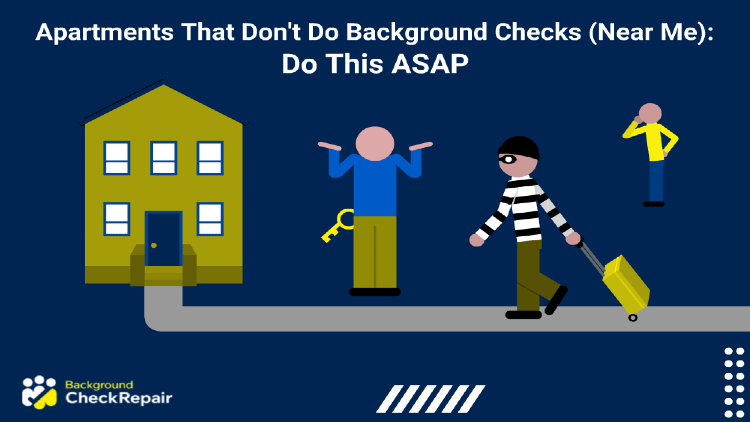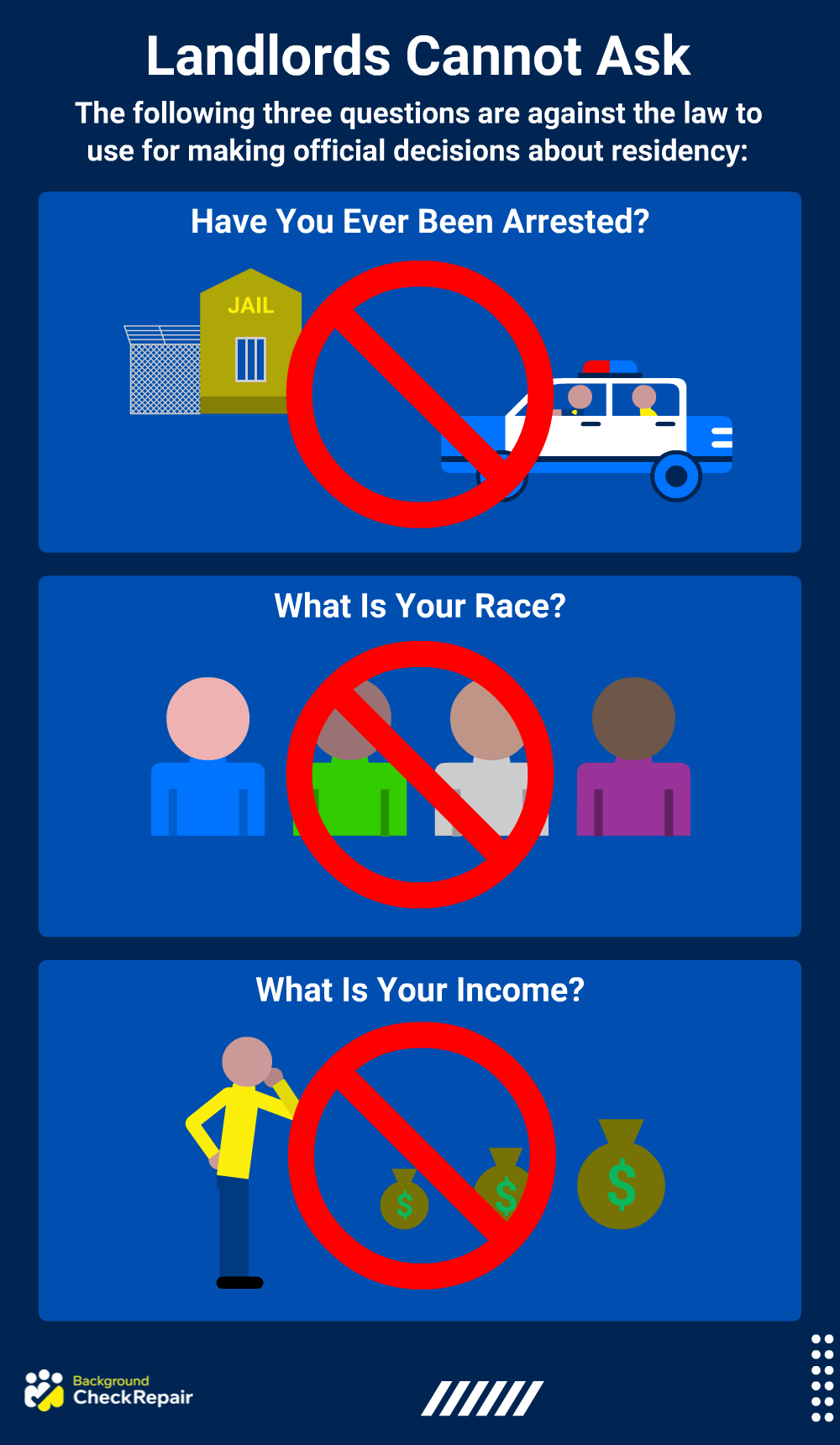How Long Do Background Checks Take for Apartment Buildings?
How long does a background check take for an apartment rental? There is no precise answer because it depends on the type of check, but typically results take one to five days to come back.
 Written by Background Check Repair
Written by Background Check Repair
Background Checks | May 6, 2024

Table of Contents
Most property owners and large residential complexes run background checks on applicants to screen their criminal and credit history before approving residency, but there are many apartments that don’t do background checks. In fact, finding a home that doesn’t discriminate based on criminal history doesn’t have to be a difficult process. But, there is one thing that anyone looking for a rental unit should do as soon as possible: conduct a background check on yourself first, to access the same records and information that potential landlords will see.
Why?
Because many landlords end up using records that aren’t accurate and illegally disqualify you from becoming a tenant.
Running a personal background check also helps former offenders identify any violations or offenses that could be expunged from their record because there are a number of criminal records that can be erased. So, by running a background check as soon as possible, the options for living opportunities can expand.
However, if a criminal background screening does show “disqualifying offenses,” there are still some things that a person can do to find apartments that don’t do background checks. The following 10 tips offer practical and immediate solutions.
Finding apartments that will allow former felons a new start doesn’t have to be difficult. With the following tips, anyone can navigate the process and avoid wasting time with unwarranted or frustrating rejections.
If someone with a felony is looking for a new apartment, they may have better luck with landlords who own or manage just a few properties, rather than corporate apartments or large complexes. Often, large corporations are operated by property management groups, which typically conduct background checks for all tenant applicants due to an across-the-board policy.
On the other hand, private landlords who manage only a few properties may not conduct screenings, or in general have less strict rules about who they’ll accept as a resident. Since there are no laws requiring landlords to conduct background screenings, it is their choice whether to do so or not. If an applicant presents strong employment information and dependability, those traits can go a long way with a private landlord.
There are many community groups working to help low income individuals and former felons find affordable and accessible housing.

Conduct an internet search for any community housing groups or housing experts in the area who are able to help and are familiar with this often difficult process.2 Some national groups include:
Many states offer reentry programs for discharged inmates, to help them transition smoothly back into society. Many of these programs offer halfway housing or other services to help individuals obtain accessible housing.
For example, the state of Washington runs a Reentry Housing Pilot Program (RHPP) to help high-risk prisoners who have been released from prison,11 without a stable housing option to return to. These programs aim to help those with a criminal record return normally to society and help them avoid returning back to prison.
To find a state-sponsored program, simply use the internet to conduct a Google search, using the words “[State name] Housing Programs” and then navigate to a site that includes a “.gov” domain name address.
If someone with a criminal record doesn’t want their background check to prevent them from living in their apartment of choice, they could seek a family member or friend to apply for the apartment for them. If this substitute applicant has a clean record and is willing to sign their name on the lease, this may help someone who is a previous felon find the best apartment for them, rather than choosing from more limited options.
When using this option, the person with the criminal record can pay their family member or friend privately, while the person on the lease pays the money to the landlord. Keep in mind, however, that the person on the lease is ultimately responsible, and if the apartment rental agreement prohibits sub-letting, this action should not be used.
Those with a criminal history may qualify for Section 8 Housing, depending on the type of crime that they were charged with.3 This federal government program provides certain Americans with a housing voucher that can be used in subsidized housing projects or elsewhere. This can help people with a disqualifying criminal background check afford an apartment that they otherwise could not.
However, many vouchers still require recipients to locate their own housing. Nonetheless, having a voucher may help increase someone’s chances of being accepted by a landlord, even for apartments that don’t do background checks, since they have proof of income.
If a felon is able to expunge their record, they will no longer have to limit their housing search to only apartments that don’t conduct background checks. In some states, a person can get certain records “expunged.” This means these records are removed from all databases,12 so that they can deny they have ever been charged with a crime, including on housing applications. However, the ability to expunge criminal records depends on the state and type of crime. In most states, heinous crimes such as murder, rape, and assault can never be expunged.
In some states, expungement is a lengthy legal process. It may require waiting a certain period of time after serving a sentence, filling out a form, attending a court appearance, and waiting for a judge’s decision. In other states, expungement may be more automatic.4 For example, in Maryland, certain criminal charges, such as civil offenses for specific drug possession and serious driving violations, are automatically expunged after 3 years, requiring no work from the person convicted of the crime.5 However, it still might be helpful for a person to run a background check on themself afterward, to ensure that this has been removed from their record.
In the state of Florida, getting a criminal history record expunged requires that a person apply for a Certificate of Eligibility issued by the Florida Department of Law Enforcement.13 However, only certain offenses qualify to be expunged, such as juvenile offenses, lawful self-defense, human trafficking for victims, and related offenses. A person must research what type of offenses are eligible for expungement in their specific state, before pursuing this option. It may be helpful to hire an attorney to aid in this process.
Subletting allows someone to take over another person’s lease, or pay the person officially on the lease privately, without having to apply for the apartment themselves. Typically, since the person subletting the apartment looks for the person, rather than the landlord, it is unlikely that the person will run a criminal background check since they are eager to get someone to replace them on the lease. To find someone looking for a sublet, a person should search online social media groups, such as on Facebook, or Craigslist.
Keep in mind, that there are legalities surrounding sublets, and many rental agreements specifically forbid them. Check with the state laws concerning rental agreements before signing a sublet.
While looking for long-term rental property, it may be feasible to seek an extended stay at a motel, hotel, Airbnb, or other temporary housing. Many of these options offer month-to-month renting options, with the choice for several months at a time, without a background or criminal history check.

Often, if a person meets with a hotel or motel owner in person, they may be able to secure a deal or discount if they pay several months in advance. To explore this option, conduct an online search for hotels and motels in the area, or make an online account with Airbnb.
If someone applying for an apartment matches all of the leasing criteria except for the criminal history component, they may still be able to obtain housing. If financially feasible, someone with a criminal background should offer to pay the first three months of rent upfront, to incentivize a landlord to trust them as a reliable renter. Alternatively, they could offer to pay a higher security deposit.2
Finally, if someone has exhausted all other housing options, they should contact their parole officer to learn about other housing opportunities or government services. For example, the city of Chicago operates Reentry Support Centers around the city,14 to help individuals gain housing assistance and other support. Speaking with a parole officer can help someone with a criminal background learn more about the local resources available to them.
There are certain questions that are illegal for any landlord to ask on a rental application. The following three are against the law to use for making official decisions about residency.

Legally, in most states, a landlord cannot ask about arrest records during an initial housing interview. In some states, this question is prohibited on a primary housing application. This is because an arrest record does not necessarily mean that someone has been convicted or found guilty of a crime.
However, in most states, these laws do not prevent a landlord from running a criminal history background check on a potential renter, after they have already had an interview. For instance, in Washington DC, a landlord can only conduct a background check once a conditional housing offer is made.6
Under the Fair Credit Reporting Act (FCRA),15 a landlord must first receive permission from a housing applicant before conducting a criminal background check. This is federal law and therefore applies to all 50 states, as well as the District of Columbia. While a renter has the legal right to deny a landlord permission to conduct a background check, a landlord also has the legal right to deny housing based on these grounds. If a landlord wants to conduct a screening, it is best for a housing applicant to be honest about their criminal record.
Nonetheless, some states have protections for those with a criminal history. For example, in the state of Washington, Fair Chance Housing legislation prevents landlords from unfairly discriminating against those with a criminal record.16 This legislation also prohibits landlords or apartment complexes from including advertising language that deters those with a criminal record from applying for housing. While it may be a company’s policy to not rent to those with a criminal background, this cannot be included in any housing advertisements.
According to the Fair Housing Anti-discrimination Law, a landlord cannot ask about the race, religion, or nationality of a housing applicant. In addition to this, a landlord must treat all applicants the same. For instance, if a landlord conducts a background check on one housing applicant, but not another, it can be considered discrimination.
If someone believes they have been asked to complete a criminal background check due to their race or religion, while other tenants were not screened, they should contact an attorney.
A landlord is legally permitted to ask about the monthly or annual income of an applicant so that they can ensure that they can afford the apartment. Often, a landlord may run a credit history check or ask for proof of income, such as a pay stub. Typically, a landlord requires that a tenant’s rent does not exceed about 40% of their income. In addition to this, a landlord may also ask about past bankruptcies, prior evictions, employment history, and related information.6
Remember, the best chance at finding a no criminal background check apartment is to apply for apartments managed by a landlord with a few properties, rather than a corporate apartment complex. However, there are still other ways to find apartments that do not conduct background checks.
First, a person should search for housing on a real estate website that specifically shares apartments that do not exclude tenants based on felony convictions. Many housing sites allow apartment seekers to filter their search results, to only include certain options. If possible, the apartment seeker should add a filter on any website to only include apartments that do not conduct background checks.7
 If someone is looking for a landlord with only a few properties, it may be wise to drive or walk around some neighborhoods that they are interested in living in. Often, landlords may post signs in the windows of apartments or townhouses available for rent, with a phone number to call for those interested.
If someone is looking for a landlord with only a few properties, it may be wise to drive or walk around some neighborhoods that they are interested in living in. Often, landlords may post signs in the windows of apartments or townhouses available for rent, with a phone number to call for those interested.
If someone with a criminal record is still having difficulty finding an apartment, it may be wise to have a character witness or a letter of recommendation. This can come from a parole officer, mentor, employer, teacher, or professor. While it may not erase a criminal record, it may persuade a landlord with a few properties, who is likely more personable than the management at a corporate apartment complex.
Before anyone applies to a new apartment, they should first run a background check on themself, so they are aware of what information a landlord will have access to, even if they are only on probation. There are various options to “perform a records check on yourself,” so there is no excuse to miss this vital step when trying to find a new apartment.
For someone to run a thorough background check on themself, they should be sure to conduct a level 2 background screening, rather than just a name-based search. A level 2 background check will reveal national criminal history, rather than just state criminal history revealed by a level 1 background check. This will ensure comprehensive and accurate screening, similar to the type of screening that a landlord may conduct.
To protect individuals, the Fair Credit Reporting Act prevents background checks from including certain records that are older than 7 or 10 years old.17 In particular, arrest records older than 7 years in any state cannot be included in a background check. However, each US state has its own regulations, in addition to these federal laws.
For example, both the states of California and New York have laws prohibiting any criminal records older than seven years from appearing on a background check. However, in Tennessee, all criminal records can be included indefinitely on a background check, even if it is only an infraction or misdemeanor from decades ago. In most states, the majority of felonies can be included on background checks indefinitely, especially if they are heinous or violent crimes.1
When searching for new renters, many landlords and most housing complexes choose to run background checks on applicants. If someone has a criminal record, they should run a background check on themself to verify what will be revealed. If they cannot pass a screening, they should seek out apartments that don’t do background checks owned by an individual, subletting opportunities, and other housing options, so they can still obtain safe and affordable housing
How long does a background check take for an apartment rental? There is no precise answer because it depends on the type of check, but typically results take one to five days to come back.
1Klazema, M. (2019, October 16). How Far Back Does a Criminal Background Check Go in Tennessee? Backgroundchecks.com. Retrieved November 14, 2021, from <https://www.backgroundchecks.com/blog/how-far-back-does-a-criminal-background-check-go-in-tennessee#:~:text=A%20criminal%20history%20check%20conducted,when%20making%20their%20hiring%20decisions>
2Help For Felons. (2019). Guide on Finding Felon Friendly Apartments and Housing. Help For Felons. Retrieved December 28, 2021, from <https://helpforfelons.org/felon-friendly-apartments-housing-1/>
3Free Grants for Felons. (2024). Section 8 Assistance Program for Felons. Free Grants for Felons. Retrieved December 29, 2021, from <https://freegrantsforfelons.org/section-8-assistance-program-for-felons/>
4Lo, K. (2020, April 23). Expunging and Sealing Criminal Records. American Progress. Retrieved December 29, 2021, from <https://www.americanprogress.org/article/expunging-clearing-criminal-records/>
5The People’s Law Library of Maryland. (2024). Expungement and Changing Your Criminal Record. The People’s Law Library of Maryland. Retrieved December 29, 2021, from <https://www.peoples-law.org/expungement-and-changing-your-criminal-record>
6Kwiatkowski, K. (2020, July 17). Questions Landlords Can’t Legally Ask on Rental Applications. Lawyers.com. Retrieved December 29, 2021, from <https://www.lawyers.com/legal-info/landlord-tenant-law/for-landlords/questions-landlords-cant-legally-ask-on-rental-applications.html>
7Rent Own Sell. (2019). The Ultimate Guide on Finding Felony-Friendly Apartments. Rent Own Sell. Retrieved April 15, 2021, from <https://www.nyrentownsell.com/blog/felon-friendly-apartments/>
8US Department of Housing and Urban Development. (2024). Need Homeless Assistance? Hud Exchange. Retrieved May 1, 2024, from <https://www.hudexchange.info/housing-and-homeless-assistance/homeless-help/>
9U.S. Department of Housing and Urban Development. (2024). Housing Choice Vouchers Fact Sheet. U.S. Department of Housing and Urban Development. Retrieved May 1, 2024, from <https://www.hud.gov/topics/housing_choice_voucher_program_section_8>
10Catholic Charities USA. (2024). Catholic Charities USA Website Homepage. Catholic Charities USA. Retrieved May 1, 2024, from <https://www.catholiccharitiesusa.org/>
11Lutze, F., Rosky, J., Hamilton, Z. (2015, January 5). A multisite outcome evaluation of Washington state’s reentry Housing Program for High risk offenders. Homelessness and Reentry. Retrieved May 1, 2024, from <https://s3.wp.wsu.edu/uploads/sites/436/2014/11/Criminal-Justice-and-Behavior-2014-Lutze-471-91.pdf>
12Cornell Law School. (2024). Expunge. Cornell Law School. Retrieved May 1, 2024, from <https://www.law.cornell.edu/wex/expunge>
13Florida Department of Law Enforcement. (2024). Seal and Expunge Process. Florida Department of Law Enforcement. Retrieved May 1, 2024, from <https://www.fdle.state.fl.us/Seal-and-Expunge-Process/Seal-and-Expunge-Home.aspx>
14City of Chicago. (2024). Services for Ex-Offenders. Family & Support Services. Retrieved May 1, 2024, from <https://www.chicago.gov/city/en/depts/fss/supp_info/ex-offender_and_transitionaljobsprogram.html>
15U.S. Equal Employment Opportunity. (2024). Background Checks: What Employers Need to Kno. U.S. Equal Employment Opportunity. Retrieved May 1, 2024, from <https://www.eeoc.gov/laws/guidance/background-checks-what-employers-need-know>
16Seattle Office for Civil Rights. (2023, June). Criminal History Protection. Seattle Office for Civil Rights. Retrieved May 1, 2024, from <https://www.seattle.gov/civilrights/housing-rights/criminal-history-protections>
17Federal Trade Commission. (2018, September). Fair Credit Reporting Act. Federal Trade Commission. Retrieved May 1, 2024, from <https://www.ftc.gov/system/files/documents/statutes/fair-credit-reporting-act/545a_fair-credit-reporting-act-0918.pdf>
We use cookies to ensure that we give you the best experience on our website. If you continue to use this site we will assume that you are happy with it